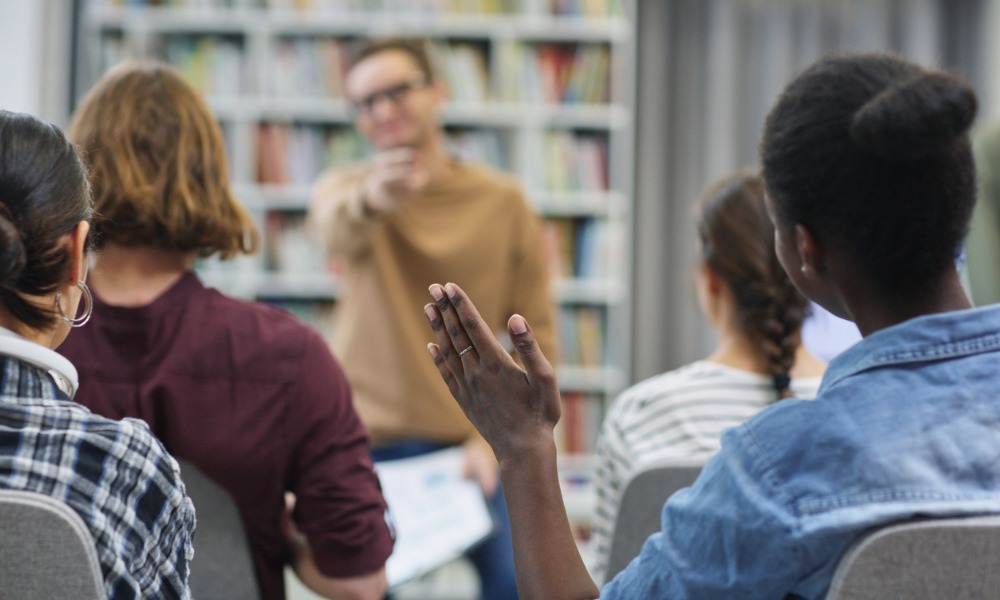Open dialogue at law schools is crucial for students to truly thrive

Being a law student today is arguably more challenging than in the past, which may be surprising coming from someone who identifies as a female and a person of colour.
During the first year of law school, classroom debates were scarce, focusing on foundational Canadian law courses such as contracts and constitutional and criminal law. However, in the second year, it slightly shifted from only learning theory to taking seminar classes with a discussion component. While social media has become an excellent platform for people to express their thoughts and opinions or engage in dialogue, I can’t fully reconcile what makes social media so different from a classroom that makes students go silent. While I am no expert in education, I think a reasonable answer is that students, like others, are afraid to be judged; in other words, we fear being ''cancelled.''
In most of the classes I have been in, dialogue is minimal, often restricted to meeting the participation requirements for the course. While some students are quiet because they haven't done the necessary reading to engage in dialogue, others may choose not to because they fear public speaking. Most students, like me, likely feel uncomfortable asking questions or sharing our opinions due to the fear of inadvertently saying something offensive or politically incorrect. Doing so would get us cancelled in front of our peers.
However, I believe this fear often prevents students from learning by participating in meaningful conversations.
Empathy, in my view, is a cornerstone of excellent lawyers. Empathy allows us to understand why and how people think by putting ourselves in their shoes. While we can't truly do so, we can start by listening to what others have to say. People's thoughts and opinions are based on their worldviews, which vary due to race, religion, gender, and socioeconomic status. The list is endless. When people ask me questions specific to my heritage or cultural practices, they are generally out of curiosity, as opposed to ignorance, which I can easily distinguish in most cases.
In my experience, many people today believe that asking questions about someone's background is ignorant and potentially racist. But the reality is, I wouldn't expect a white person to know everything about my culture, nor do I expect someone to go out of their way to Google everything about my heritage and culture and try to teach it to me later (which has happened).
For me, it all comes down to someone's intention. In a classroom setting, we must acknowledge that no one is an expert on immigration, gender, or human rights; instead, we are all there to learn. Coming in with an agenda would be bold, given that we will still see each other next week. So, what better way to learn than directly from my classmates? Law students are being taught to be critical thinkers and analyzers, and the primary way to do so is by asking, engaging in conversation, being curious and challenging the status quo. Otherwise, universities would just be producing cookie-cutter lawyers.
As a minority, I can genuinely feel the impact of diversity in the legal profession, whether by participating in a firm’s recruitment or by how a firm treats me. Diverse perspectives enrich law firms and allow for a more inclusive legal system. To create impactful individuals in the legal industry, law schools must expand the boundaries of intellectual conversations. This is crucial for developing critical thinking skills and producing lawyers with unique perspectives rather than replicas reciting statutes and case law.
This is not to say we should force students to talk and forget about accommodating disabilities. Instead, I am asking students and teaching staff to consider being more comfortable with being uncomfortable. This could mean we don't always have to follow the status quo or excessively fear social pressure. Recognizing the profession's ripple effects reinforces the importance of actions impacting more people than anticipated. Committed academics, professionals and intellectuals respect diverse opinions, fostering an environment of healthy disagreement and intellectual growth.
It is likely very challenging to teach at a law school today. The onus falls on the professors and instructors to create an environment that is both safe and promotes dialogue. In the classroom, cancel culture stifles an environment where mistakes can be made and learned without public judgment. Embracing uncomfortable conversations allows for the development of robust characters in society.










